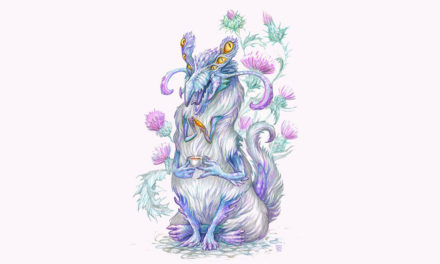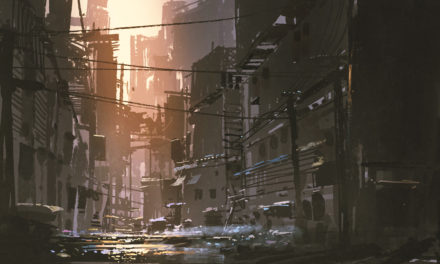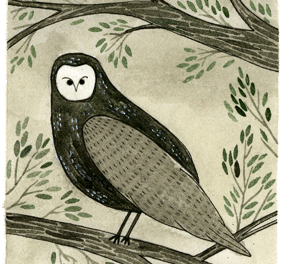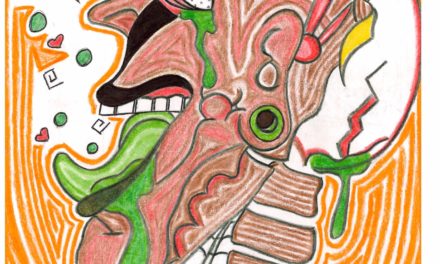Apex
by Hannah Hulbert
Issue 23: Sound | 2,042 words

Untitled, © CYC/Adobe Stock
They called to him in his dreams. Out from the hallucinated shadows in his unconscious mind, eerie voices rose and built to a melancholy crescendo. Then they fell away, only to be replaced by others—each unique as a fingerprint, pressed into his memory. Wherever he hid, they found him. They called, not for his blood, but for him to run with them; for him to become one of them. He fought their alluring song and defied their seductive offer. He cowered in the dark, cold and damp with sweat, as the voices surrounded him.
And still, they called when he awoke.
Willoughby turned off the alarm on his phone and hauled himself out of bed. It was still dark. He ground his palms into his face, as though that would scour the cries from his mind. They’d become harder to ignore over the past few months. Even when he couldn’t hear them, his ears twitched at every little sound, searching. Part of him wished that he had someone to confide in, to check that he wasn’t going mad. But the other part was afraid speaking the words aloud would solidify his madness. He shook his head, as if shaking the sounds out of his ears.
The rush of the shower at least masked them for a few precious minutes. The further he ranged from sleep and the more focused his mind, the easier it was to tune them out. By the time his coffee had kicked in and he was stepping out the door of his apartment, the voices had faded. But still, the memory of their baying echoed around his skull. His scalp prickled with fear, not at what they might do, but at what he must not.
He concentrated on the ringing of his footsteps around the gloomy stairwell as he descended. Focusing on the normal details of his normal life helped. The heavy front door moaned as he pushed it open before stepping out onto the gray-lit street.
The sun was still laboring its way above the rooftops, staining the clouds a garish watermelon pink. Willoughby zipped up his jacket, raised the hood, and strode toward his bus stop on the corner, lulled by the everyday rhythm of the city. He immersed himself in the environment he was supposed to fit into, bland and void of mysterious sounds.
A taxi passed, speckling his face with oily spray. He blinked it from his eyelashes and squinted up the street for the bus. A pattering on his hood added gentle percussion to the bass rumbling of a truck. But in the infinitesimal gaps between the sounds he could still discern the distant howling.
He wriggled his cold toes, only to discover the coldness was, in fact, wetness. He checked his watch. The bus was late. He was late. The rain beat down on him, dripping from the end of his nose. His jaw clenched and muscles tensed, but the weather was not an enemy to lash out against. Getting cold and wet happened to everyone: a fact of life. He took a ragged breath and told himself to calm down as he shoved his hand, balled into a fist, back into his pocket.
The bus after the one he usually caught arrived twenty minutes later. It smelled of mildew, and the seats were packed. He clung to a railing as they lurched off, swaying on the balls of his feet. He focused on the steamed up, viewless window, trying not to hear the voices. A baby cried. The bell rang. Droplets tricked down inside his clothes. He fidgeted, unable to get comfortable. Forty-five minutes later, he reached his stop and escaped the humid can of chattel back into the rain.
He checked his watch and then broke into a jog, weaving between the expressionless walkers. He didn’t slow to skirt the puddles, but splashed right through, soaking his trouser legs. The crossing light shone red. Every second that ticked by while he stood motionlessly waiting was another second he was late. He glanced at his watch again and then up and down the street through the falling sheets of water. He stepped into the empty road.
A car horn blared, filling the world with sound and light. A gleaming blur of black and silver swung round the corner. Willoughby leaped back, heart thundering. Then he waited on the curb with the docile crowd for the light to change.
He burst through the office doors, panting. Everyone stared when he skidded on the polished foyer floor. Face flushed, he scurried toward the elevators, shoes squelching. As he ascended to the thirty seventh floor, the people that entered and exited wrinkled their noses at him. He tried to shrink into the corner. The universe may be conspiring to crush him to the very edge of existence, but at least no disembodied calls could reach him here in the slowly rising metal box.
He barged past the other occupants when the elevator doors opened at his floor, stumbling into the lobby. The receptionist ignored him as he raced past, trailing damp footprints all the way to his cubicle.
Dan on his left and Judy on his right sat transfixed by their screens. Willoughby draped his sodden jacket over the back of his swivel chair between them before collapsing into it. He combed his wet hair back with his fingers to redirect the falling droplets away from his desk as he waited for his login to process. He gulped air and his pulse steadied. The office was full of white noise: clicking keyboards and the susurrus of low conversation. But somewhere beyond that, the voices still howled. They howled for him by a name he didn’t know, yet was irrefutably his.
Someone cleared their throat behind him, and he spun on his chair.
His line manager stood there with his hands on his hips and a frown crinkling his forehead. Willoughby’s stomach contracted. He avoided the man’s dull, bovine eyes and plastered a sincere expression onto his moist face. He nodded apologetically along to the tirade of insults directed at his timekeeping. But the whole time, his ears were tuned to the cries that seemed to filter out of the circulation vent overhead, enticing him to run away with them. He tried to remind himself that he needed this job, that he had a normal life that he would be a fool to abandon. He bowed his head in an act of submission, and his line manager stomped off to his office.
Willoughby didn’t allow his gaze to flicker away from his screen for the rest of the morning, no matter how strongly the wild song tugged at his heartstrings. The heating was unnaturally high, and his damp shirt chaffed his skin. He kicked off his leaky shoes under his desk in a futile attempt to dry his steaming socks. Somehow, being warm and wet and motionless was worse than being outside in the rain.
As a display of contrition for his late start, he bought a limp sandwich from the vending machine and worked through lunch. By midafternoon, his eyes were glazing over. The sound had been growing louder all day. Now it was loud enough that he wondered why nobody else could hear it. He toyed with the idea of peering round his cubicle wall to ask Dan or Judy, but shook the thought away. They probably already thought he was weird—with his shoeless feet and his humiliating chastisement. He kept his head down, striving to merge into the mundane world around him.
A rowdy gang of shareholders lumbered round at 4 p.m. on their annual tour of the business headquarters. Willoughby locked his eyes on his monitor, but his mind was focused on the herd of them. They stopped in the aisle near his cubicle, laughing and boasting together in their pressed designer suits. A young woman from public relations struggled to shepherd them out of the department.
Willoughby blinked, attempting to appear alert. None of them so much as turned to look at him, but their looming presence waved a primitive red flag in some recess of his brain. Their jokes and posturing raised his hackles. One beefy man tossed the keys to a Rolls nonchalantly as he leaned on the cubical wall, masticating on a stick of gum. Willoughby found his lip curling back and fought to keep his teeth concealed until the shareholders sauntered off to graze on drinks and canapés. Willoughby’s stomach growled, but he had too much to catch up on to disappear to the vending machine again. He added the complaints of his belly to the list of things he had to ignore and went back to work.
It was dark by 5:30. Willoughby joined the flock of workers plodding out of the lobby and back into the rain. The universe was gray. He didn’t bother to raise his hood; his jacket was still sodden from the morning’s commute, and his feet were the same. He was already saturated, and the rain simply sloughed off his hunched form. He joined the procession of pedestrians headed toward the crossing on the other side of the plaza. The quake of footsteps and hammering of the raindrops dampened the distant cries but failed to drown them out fully.
The crossing light turned green, but the jostling crowd ahead of him was large. By the time he reached the curb it was red again. He pressed the button and waited placidly, eyes fixed on the middle distance. His bus stop was just around the corner on the other side. One forty-five-minute ride and a short walk home and he’d be able to get warm and dry. Only a few more hours and he could retreat into unconsciousness, the one place he could run free without stepping out of line and exposing himself. He just needed to hold himself together for a few more hours.
The ground trembled a little, and the howling disappeared behind a low, pervasive grumble. Willoughby turned toward it. A gleaming black car raced through the lights as they changed. A wave of dirty water crashed over him. He gasped. As the car sped round the corner, he caught a glimpse of the Spirit of Ecstasy on the hood.
Willoughby stood there, dripping, his heart pounding with shock and then fury. He pictured that bullish man leaning on the cubicle wall. His body trembled.
The howl rose again, but this time it was much closer—welling up inside his own throat. The million tiny irritations he had suppressed over the days and months and years of his lifetime vibrated. The song consumed him—transformed him.
He chose to let go.
The collar around his thickening neck burst. The soggy cuffs binding his wrists tore when he tensed. The cheap imitation leather shoes ripped from the soles as his toes stretched. His torso expanded to contain the multitude of emotions that he finally allowed himself to feel. His muscles and sinews and bones realigned themselves in cathartic agony, shaping him into a better, truer form.
He lurched forward, planting his hands on the flooded pavement, panting. People around him cried out in terror and backed away. But the other voices, voices like his own, were approaching along the drenched streets. When he grinned, his mouth was wide and bristling with fangs. When he shook the droplets from his hair, the scraps of his suit fell to the ground. His new coat resisted the rain in a way the artificial one he had shed never could. He barely felt the cold. Despite the horror written on the faces of the people around him, there was a rightness to this. He raised his new, narrow face to the sky and sang.
For the first time, he sang a song of belonging and freedom. The promises that those disembodied voices had been whispering all these years—they had all been true. The pit of his belly gnawed with regret that he had ignored them so long. But it didn’t last. There was no space in this new form for regret. As his song died on the gust of wet air, so did his old self.
And then he ran.

Hannah Hulbert
Hannah Hulbert is a full-time mum and part-time writer from the south coast of England. She enjoys looking for mushrooms, doings crafts, and drinking tea. Her story “Petrichor” received a Pushcart nomination. You can find a full list of her publications on her website: https://hannahhulbert.wordpress.com.




